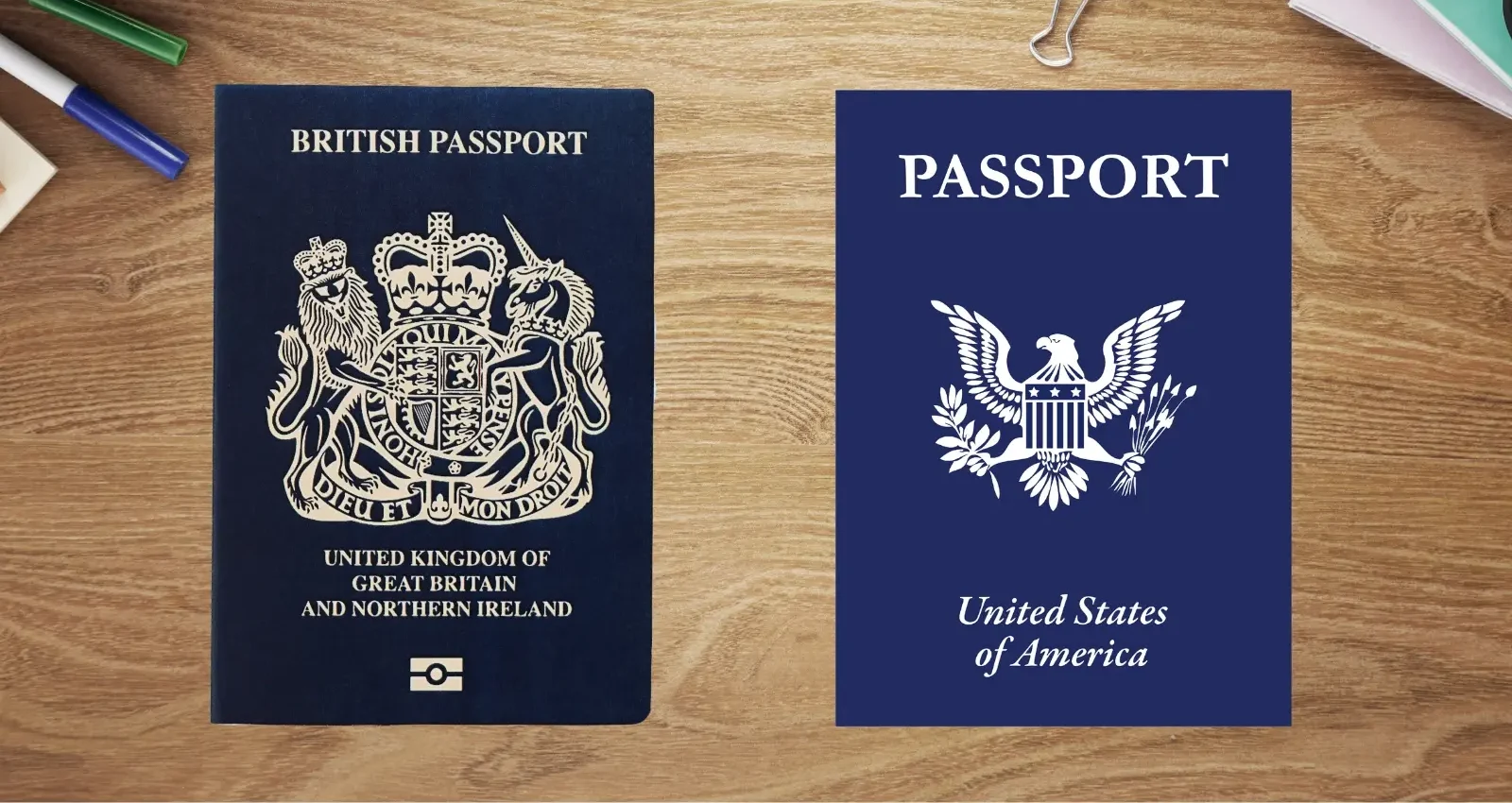| All | Blog | Videos | Webinars |

Not all countries allow you to have dual citizenship. For the ones that do, such as the UK, there are benefits to having two citizenships.
However, there are also some disadvantages to having dual citizenship that many people may not be aware of.
We shall take you through some of the advantages and disadvantages that you should be aware of. After all, if you want to keep your current citizenship but also want British citizenship, it is your choice, and you should be informed of your options.
First advantage: freedom
Having dual citizenship can give you more freedom to choose where to live and work, as you will have the right to both in any country that you have citizenship for.
Having two passports also opens up your travel options, as some passports allow you to enter more countries than others. This can give you more countries to choose from, giving you more freedom when you travel.
The UK has no limit to how many citizenships people can hold, so in theory, you could have more than just dual citizenship. You could make a home in several countries around the world, if they also allow for numerous citizenships.
Second advantage: healthcare
If you are a citizen of another country but move to the UK and decide to settle here, then you will likely want to be able to access benefits. This may include as free healthcare from the NHS in the event that something happens to you.
We can get ill at any time in our lives, so ensuring that you have access to good quality healthcare services is vital to a healthy and happy life.
Those without citizenship, or who do not have settled status, will have to pay the Immigration Health Surcharge.
One of the advantages of dual citizenship, is that you will have full access to British healthcare services if you hold British citizenship.
Third advantage: more rights
When you naturalise as a British citizen, you will have more rights than before. People in the UK on a visa have no recourse to public funds.
People who have settled in the UK through paths such as Indefinite Leave to Remain have most of the same rights as British citizens, but many cannot vote in national elections as a result of what their home country is. Settled citizens can also lose their settled status if they leave the UK for too long, meaning that they would possibly have to apply for a Returning Resident Visa to restore it.
However, with British citizenship, you will be able to vote in every election, leave the UK for however long you want, and of course, access any benefits that apply to your situation. You and your children will also be able to access high quality education, setting them up for a good life in the future. For example, international students pay higher fees to UK universities compared to domestic students.
Depending on your situation, dual citizenship means that you will not only be able to continue to vote in elections back in your home country, but you can also vote in the UK as well. You will be able to have your say in both countries you have made a home.
“
”
First disadvantage of dual citizenship: tax
If you have dual citizenship, you may still have to pay taxes in the country that you no longer live in, simply because you hold citizenship there still.
For example, US citizens who live abroad are still required to file taxes to the Internal Revenue Service (IRS).
This means that not only will you have to pay taxes in the UK, you may also have to pay them to your home country.
Second disadvantage: fewer job prospects
In some countries, you cannot hold certain positions if you have citizenship in another country. For example, you might not be able to get a role in the government, the military, or in the judicial system if you hold two nationalities. The UK does not have a ban against, for example, people being dual citizens and working in the Government, but your home country might.
However, you will still have many other job roles available to you. There are many other paths to take, so if you were considering one of the mentioned career paths, you will have to look at doing something else if you get dual citizenship.
Third disadvantage: loss of citizenship
When you decide you want to get British citizenship, you may end up losing your original citizenship from your home country. This is because not every country has legally recognised dual citizenship, and view getting a new citizenship as essentially renouncing your current one.
Two countries that do not accept dual citizenship are China and India.
You should consider whether it is worth losing your original citizenship if your country does not allow for dual nationality.
Fourth disadvantage: embassy assistance
Those with dual citizenship who seek the help of their home embassy will not be able to get it if they are in another country for which they hold citizenship.
For example, the British embassy cannot help someone who lives in Brazil and has both British and Brazilian citizenship. In the event something happens, such as a natural disaster, you will not be able to get any help from the British embassy.
Citizenship means you are subjected to the full duties of a citizen of that country, so you will be held to whatever the rules are in Brazil in this example.
How to apply for British citizenship
To become naturalised as a British citizen, you will have to go through several other processes first. It is not quick.
First, you will need to get Indefinite Leave to Remain (ILR) by being on certain types of visas, for a certain number of years.
You can visit our guides to learn more about the three main ILR routes and see which one might apply to you:
There is also a 2-year continuous residence route for the Spouse Visa, and for some older visas that were a part of the old tier-based visa system.
Once you have ILR, you will need to live in the UK for at least a further 12 months before you can apply to naturalise as a British citizen.
Finally, once you have lived in the UK for 12 months after gaining ILR, you can apply to naturalise as a British citizen through the British Government’s website.
Citizenship through descent
Gaining citizenship through descent is a more complex topic, due to there being many different rules revolving around your parents, when you were born, and where you are from. However, it may be a quicker way of getting dual citizenship than through ILR.
We have an in-depth guide that you can read to see how you can get British citizenship, with most of the guide focussing upon citizenship through descent or from your parents.
How we can help
If you are reading about the advantages and disadvantages of dual citizenship because you are interested in applying for British citizenship, or simply want to research before you even apply for a visa, then we can help you.
Our expert law team have helped countless clients with their applications for both UK visas, ILR, and citizenship, as they guide them through the process and help them understand what they need to do. They can help you too.
You can book a free 10-minute assessment with a member of our team, which will allow you to discuss your situation with them, and see if they can help you or not. After this, you can book a longer, paid consultation if it is determined that we can help. The longer consultation includes actual legal advice; you have the option of a 30-minute consultation, or an hour long one.
Alternatively, you also have the option of a 15 minute consultation if you are simply interested in asking a question or two about something related to immigration matters.
Get in touch with us today if you want our expert immigration guidance.





